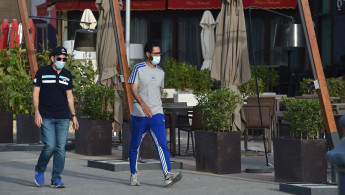Follow us on Facebook, Twitter and Instagram to stay connected
Saudi Arabia extends entertainment, dine-in Covid-19 restrictions
Saudi Arabia has extended Covid-19 restrictions by 20 days following coronavirus concerns.
2 min read
Saudi Arabia has extended Covid-19 restrictions [Getty]
Saudi Arabia has decided to extend coronavirus lockdown restrictions for an additional 20 days on entertainment venues, gatherings and dining in restaurants in an effort to prevent the spread of Covid-19 restrictions.
According to state news agency SPA, the interior ministry announced an extension of measures first introduced 10 days ago.
Cinemas and indoor sports centres will be closed, and gatherings will be banned.
The restrictions will come into effect at 10pm local time on Sunday evening, and the ministry has not ruled out extending restrictions again.
Earlier this month, Saudi Arabia suspended entry into the kingdom from 20 countries. The ban applied to neighbouring United Arab Emirates, Egypt, Lebanon and Turkey.
It also included Britain, France, Germany, Ireland, Italy, Portugal, Sweden and Switzerland.
Read more: How the GCC reconciliation deal could reshape the region's power balance
|
The ban also applied to the US, Argentina, Brazil, Pakistan, India, Indonesia, Japan, Pakistan and South Africa.
The only people able to enter the kingdom are Saudi citizens, diplomats and medical practitioners and their families, Reuters reported.
Saudi Arabia has reported nearly 369,000 coronavirus cases and almost 6,400 deaths, the highest among Gulf Arab states.
Daily infections dipped below 100 in early January, from a peak of nearly 5,000 last June. However, new daily infections have tripled since then, with 306 cases reported by the health ministry on Wednesday.
Saudi Arabia launched its coronavirus vaccination campaign on December 17 after receiving the first shipment of the Pfizer-BioNTech vaccine.
The health ministry said the programme would roll out in three phases, starting with people over 65 and those with chronic ailments, or who are at high risk of infection.
But last month the ministry said it was forced to slow the rollout due to a delay in vaccine deliveries.





 Follow the Middle East's top stories in English at The New Arab on Google News
Follow the Middle East's top stories in English at The New Arab on Google News
![The UAE is widely suspected of arming the RSF militia [Getty]](/sites/default/files/styles/image_330x185/public/2024-11/GettyImages-472529908.jpg?h=69f2b9d0&itok=Yauw3YTG)
![Netanyahu furiously denounced the ICC [Getty]](/sites/default/files/styles/image_330x185/public/2024-11/GettyImages-2169352575.jpg?h=199d8c1f&itok=-vRiruf5)
![Both Hamas and the Palestinian Authority welcomed the ICC arrest warrants [Getty]](/sites/default/files/styles/image_330x185/public/2024-11/GettyImages-2178351173.jpg?h=199d8c1f&itok=TV858iVg)